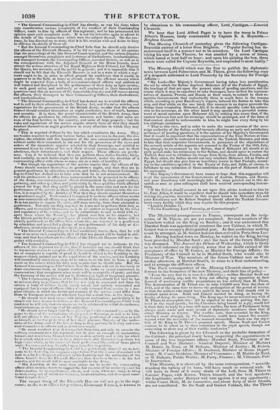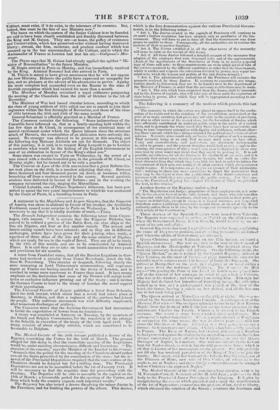The Ministerial arrangements in France, consequent on the resig- nation
of M. 'Ehlers, are not yet completed. Several members of the Chambers waited on the King on Sunday ; and it was understood that Marshal Soult was appointed to construct the new Cabinet, in which M. G nizot was to occupy a distinguished post. At that conference nothing could be arranged, as M. Guizot had not then arrived in Paris from Lon- don, Having reached town on Monday, he waited on the King, having been preceded by Marshal Soult ; and the basis of the future Ministry was discussed. The Journal des DiFbats of Wednesday, which is likely to be well informed on the subject, states that no doubt existed of the
acceptance of office by M. Guizot, as Minister for Foreign Affairs ; the Presidency of the Council to be in Marshal Soult, who would also be Minister of War. The members of the future Cabinet met on Wed- nesday afternoon, at Marshal Soult's, to come to a final understanding, and to arrange the different offices.
The Paris correspondent of the Morning Chronicle observes, in re- ference to the formation of the new Ministry, and their line of policy-
" From the very first flare were few difficulties ; neither Marshal Sofa nor M. Guizot making any, and the King not offering any opposition to their
demand of continuing warlike preparations no less actively than M. Thiers. The determination of M. niers was to raise 150,000 men from the class of 1841, and at the same time to decree the prolongation of the period of service,
so that the soldiers who might have quitted the army in 1841 should still be
retained under aims. Soult and Guirot insisted on doing,. or having the faculty of doing. the same thing. The King says he never resisMd any wish of Thiers to accomplish this : All he objected to was the putting this fore- imot in the royal speech ; for the Chambers being bound to reply, would feel
it their duty tu reply in a tone still more warlike, the tone of Parliament being
always more warm and more devoid of diplomatic meekness than that of chime :Ministry or Crown. The warlike note, thus seconded by the king, reiithoeil more strongly by the Chamhers, would have roused the couutry beyond what the necessities of the moment demanded. Such was the objec- tion of the King to M. Thiere's proposed speech. Messrs. Soult and Gurzot ; consent to be silent as to their intentions in the royal speech, though not , consenting to abate any of their warlike tendencies," The following is given by the Chronicle as the probable formation of - the Cabinet ; the principal doubt being respecting the appointments to Wilke of the less important offices—Marshal Soult, President of the , Council and War Minister ; A diniral DuperK, Minister of Marine I M: Martin du Nord, or M. Dufaure, Minister of justice ; N. Guizot,
Minister of Foreign Affairs ; M. Duchatel, Minister of Home Depart- ment ; N. Cunin Gridaine, Minister of Commarce ; M. Martin du Nord, or M. Dufaure, Public Works ; N. Passy, Finance ; M. Villemain, Pub- lic Instruction. This Ministry, it is observed by the same correspondent, " notwith- standing the variety of its hues, will have much to contend with. It
will have in front of it every shade of the Left, from M. Thiers to Gamier Pages, with Barrot, 'Ehlers himself, and the best speakers; the Legitimists under Berryer will vote against it at any opportunity I whilst Count Mole, N. de Lamartine, and about forty of their friends, are not conciliated. So the Soult and Guizot Cabinet, like the Thiers Cabinet, must exist, if it do exist, in the tolerance of its enemies. But, indeed, that must be the fate of any Ministry now." The bases on which the system of the future Cabinet is to be founded are said to have been clearly established and frankly discussed between the King and M. Guizot. They are—at home, the policy of resistance and Conservatism, which has preserved order without having destroyed liberty ; abroad, the firm, moderate, and prudent conduct which was summed up in the last memorandum of the Cabinet, and to which the Ambassador of France at London had lent his aid.— Galignani's Mes- senyer. The Presse says that M. Guizot had already applied the epithet "Mi- nistry of Reconciliation" to the future Ministry.
M. Dapin arrived in Paris on Monday, and was immediately received by the King. Admiral Rosamel had also arrived in Paris. M. Thiers is stated to have given assurances that he will not oppose the new Ministry. Hitherto the public have expressed no sympathy for him, and no pleasure at the advent of his adversaries to power. Apathy the most complete had succeeded even on the Bourse to the state of feverish occupation which had existed for more than a month.
The Moniteur of Monday contained a royal ordinance postponing the meeting of the Chambers from the 28th of October to the 5th of November.
The Minister of War had issued circular letters, according to which the class of young soldiers of 1833 called out are to march to join their regiments within the first fortnight of November, and those of the class of 1834 between the 20th and 25th of the same month.
General Sebastiani is officially gazetted as a Marshal of France.
The Commerce contains the following. " Some indiscretions of the Camarilla have informed us, that at a family-meeting held within the last few days at St. Cloud, in consequence of the 'continual state of mental excitement under which the Queen labours since the atrocious attack of Darmi2s, the eventualities of an abdication were seriously dis- cussed. No stranger was allowed to be present at this meeting, and the following day Madame Adelaide set out for Brussels. The object of this journey, it is said, is to request King Leopold to go to London to ascertain what would be the feeling of the English Government in case of an abdication in favour of the King's eldest son."
Some alarm was created in Faris on Wednesday, by the arrest of a :man armed with a double-barrelled gun, in the grounds of St. Cloud, on Monday night ; but lie turned out to be only a poacher.
The Courrier de Lyon of the 27th announces that a great Reform din- ner took place on the 211th in a meadow adjoining that city. Between three thousand and four thousand guests sat down, at immense tables, branching off from a rostrum erected in the centre. Several patriotic orations were delivered in favour of Reform ; and in the evening the company retintered the city, singing the Marseillaise.
Colonel Laborde, one of Prince Napoleon's followers, has been per- mitted to spend the two years' imprisonment to which he was sentenced by the Court of Peers, in a boarding-house in Paris.



























 Previous page
Previous page